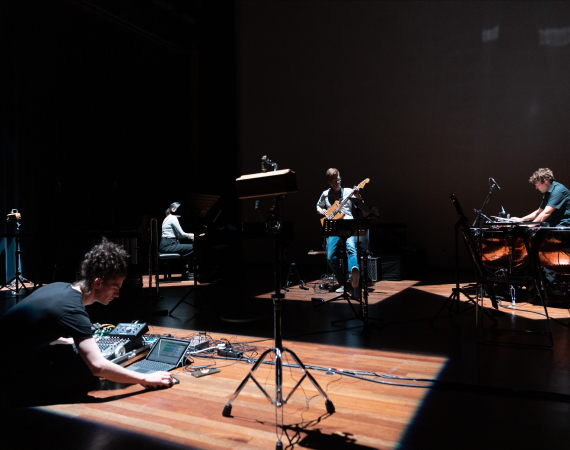Posted on Tue 17 Oct 2023
Introducing our Patterns in Practice Residency Artist
We’re delighted to announce artist Craig Scott as the recipient of our Patterns in Practice Residency - an opportunity to develop artistic ideas and conversations exploring data mining and machine learning.

Credit: Studio press shot - Peter Gavin. Live with the Nadar Ensemble @ Gaudeamus festival, NL - Herre Vermeer.
What is Patterns in Practice:
Patterns in Practice is a research project led by the University of Sheffield and the University of the West of England in partnership with Watershed. The project seeks to enhance understanding of how human beliefs, values and feelings affect how we engage with data mining (the practice of analysing large databases in order to generate new information) and machine learning (computer systems that are able to learn and adapt without following explicit instructions, by using algorithms and statistical models to analyse and draw inferences from patterns in data).
After three years of talking with people in the fields of drug discovery, higher education and the arts – the partners in the project have gained a wealth of insight and material about the data cultures that emerge when information, machine processes and people come together. This residency is an opportunity for Craig to delve into the research and develop artwork in response to what he finds.
Say hello to Craig Scott:
Craig Scott is a composer, improvising guitarist and sound artist. Working with human performers, robotics, custom built digital and analogue hardware, his work reflects on the tension that exists between human and machine made music.
For this residency, Craig will explore our evolving human relationship with technological appendages, its effect on personal and collective mental health, perception of reality and how we relate to our own bodies, tools and each other.
Craig Scott says:
“During this residency I am excited to explore using machine learning and curated data sets to partially control instruments that are simultaneously played by an improvising musician. I plan on using machine learning as a real time response to the improvising musician to explore how dataset bias affects real world outcomes.
Within the sandbox of compositional/improvisational musical approaches I will also explore the uncanny feedback loop/folding between machines made to emulate humans and humans performers emulating machines. The instrumental/bodily extensions and amputations that result from these new automated technological appendages and the felt (from both improvising musicians and listeners point of view) experience of interacting/playing with datasets trained on and imposing specific defined musical value systems."
This short clip shows an improvised human/machine duet using a Semi-Automated electric guitar designed and built by Craig.
Victoria Tillotson, Watershed’s Talent Development lead, says:
“We are incredibly excited to have the opportunity to support Craig Scott. Craig’s work is wildly inventive and delves into the relationships that exist between humans and machines. The residency will be an opportunity to build on this practice and develop experimental sound works in response to the Patterns in Practice research.”
Dr Erinma Ochu, Arts Lead on Patterns in Practice, and Samborne Bush, Impact Research Associate on Patterns in Practice, say:
“Craig’s work in the space between human and machine generated art is provocative and disruptive. We look forward to a productive dialogue as Craig’s work develops, to help us make more tangible benefits and impacts for practitioners. In that vein, the Watershed residency complements Patterns in Practice impact initiatives including cross-sector events, and a podcast mini-series to further contextualise our research insights”.
The Patterns in Practice residency will run between October 2023 and January 2024. The artist will receive financial, critical and technical support from Watershed and will share their progress via blogs and conversations on the Pervasive Media Studio website. We’re also planning a free public showcase event on Friday 19th January so save the date! More details coming soon.
Patterns in Practice is led by the University of Sheffield and UWE Bristol in partnership with Watershed, funded by UKRI. It seeks to understand the cultures of machine learning in science, education, and the arts.

![]()

![]()
